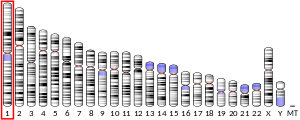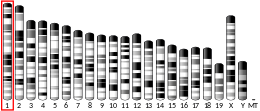OR10J1
Olfactory receptor 10J1 is a protein that in humans is encoded by the OR10J1 gene.[5][6]
Olfactory receptors interact with odorant molecules in the nose, to initiate a neuronal response that triggers the perception of a smell. The olfactory receptor proteins are members of a large family of G-protein-coupled receptors (GPCR) arising from single coding-exon genes. Olfactory receptors share a 7-transmembrane domain structure with many neurotransmitter and hormone receptors and are responsible for the recognition and G protein-mediated transduction of odorant signals. The olfactory receptor gene family is the largest in the genome. The nomenclature assigned to the olfactory receptor genes and proteins for this organism is independent of other organisms.[6]
See also
References
- 1 2 3 GRCh38: Ensembl release 89: ENSG00000196184 - Ensembl, May 2017
- 1 2 3 GRCm38: Ensembl release 89: ENSMUSG00000049605 - Ensembl, May 2017
- ↑ "Human PubMed Reference:".
- ↑ "Mouse PubMed Reference:".
- ↑ Parmentier M, Libert F, Schurmans S, Schiffmann S, Lefort A, Eggerickx D, Ledent C, Mollereau C, Gerard C, Perret J, et al. (Mar 1992). "Expression of members of the putative olfactory receptor gene family in mammalian germ cells". Nature. 355 (6359): 453–5. doi:10.1038/355453a0. PMID 1370859.
- 1 2 "Entrez Gene: OR10J1 olfactory receptor, family 10, subfamily J, member 1".
Further reading
- Fuchs T, Malecova B, Linhart C, et al. (2003). "DEFOG: a practical scheme for deciphering families of genes". Genomics. 80 (3): 295–302. doi:10.1006/geno.2002.6830. PMID 12213199.
- Strausberg RL, Feingold EA, Grouse LH, et al. (2003). "Generation and initial analysis of more than 15,000 full-length human and mouse cDNA sequences". Proc. Natl. Acad. Sci. U.S.A. 99 (26): 16899–903. doi:10.1073/pnas.242603899. PMC 139241. PMID 12477932.
- Malnic B, Godfrey PA, Buck LB (2004). "The human olfactory receptor gene family". Proc. Natl. Acad. Sci. U.S.A. 101 (8): 2584–9. doi:10.1073/pnas.0307882100. PMC 356993. PMID 14983052.
- Gerhard DS, Wagner L, Feingold EA, et al. (2004). "The Status, Quality, and Expansion of the NIH Full-Length cDNA Project: The Mammalian Gene Collection (MGC)". Genome Res. 14 (10B): 2121–7. doi:10.1101/gr.2596504. PMC 528928. PMID 15489334.
External links
- OR10J1+protein,+human at the US National Library of Medicine Medical Subject Headings (MeSH)
This article incorporates text from the United States National Library of Medicine, which is in the public domain.




